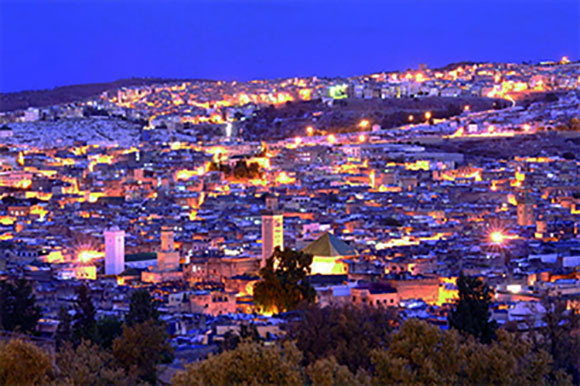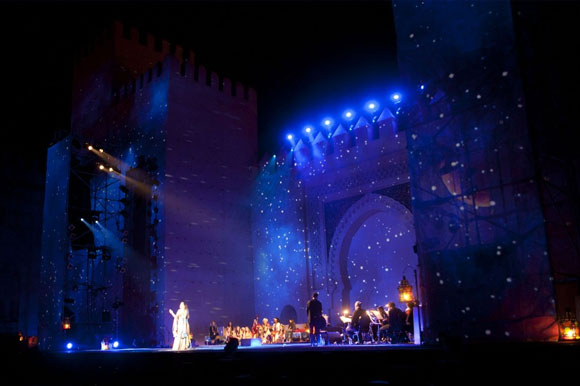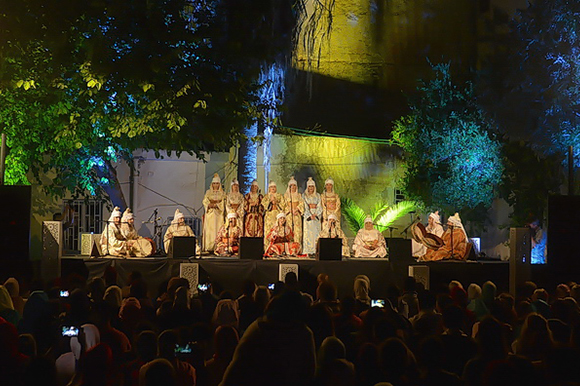
A CITY OF ART AND HISTORY
Although busy and hospitable, Fez is reluctant to instantly uncover its secrets. From its hill tops where the Merinid necropolis tombs seem to be slumbering extends a sea of coppery rooftops and fortifications swept across by the light. The fortifcations are there to protect a tangible and intangible heritage requiring time to reveal itself, but of which the traveller is able to guess the dazzling character at a glance.
Fez has been, for centuries, the political and intellectual capital of Morocco, it has always remained a center of meeting and excahnge of cultures and knowledge. The many thinkers, scholars, artists, as well as religious men and women, have been welcomed by Fez.
For example, history has it that Sylvester II, a Pope from 999 to 1003, studied in Fez dring his youth, before the introduction of Arabic numbers in Europe. During the XII Centuryn Maimonedes, a Jewish doctor and philosopher, taught at Al Qarawyine, which would (now) be the oldest university functioning nowadays. His work is an extraordinary illustration of the Judeo-Islamic symbiosis that prevailed in medieval Andalucia, and of which Fez is an echo.
A UNITING EVENT
Under the high patronage of His Majesty Mohamed VI, the Fez Festival of World Sacred Music and its Forum which were set up in 1994 and 2001 respectively, come within the scholarly, artistic and spiritual tradition of the city of Fez. Ever since its inception, this event has witnessed growing success. In 2001, the UNO declared the Festival as one of the most outstanding events that is contributing to the dialogue of civilizations.
Because of its magnetic attraction, the Festival has managed to gather artists of world fame from all horizons, sharing their quest for the sacred. The following are, but a few, names of such celebrities : Joan Baez, Patti Smith, Bjork, Ben Harper, Paco de Lucia, Ravi Shankar, Sabah Fakhri, Kadhem Saher, Mounir Bachir, Asmaa Lamnawwar, Wadi Al Safi, Julia Boutros, Sheikh Yassin Al Tuhami, William Christie, Barbara Hendricks, Jessie Norman, Jordi Saval, Tereza Berganza, Montserrat Figueras, Jean-Claude Casadessus, Arch Shepp, Randy Weston, Youssou N’Dour and Salif Keita.
Twenrty three editions of the Festival have elapsed, with quite a number of surprises, for the Festival also thrives to being a nursery that reveals to the public talents still unknown, or an event that supports daring projects, freshly born from the imagination of adventurous musicians and poets. Since a few years, now, and under the instigation of its artistic director, the Festival has also been initiating pluri-disciplinary creations of a great dimension that are presented at the opening of the Festival events. Some ninety artists have sometimes succeeded each other on the stage.


A REVITALIZED HERITAGE
The diversity of artistic propositions, of prestigious creations, of popular Sufi nights, and of some sixty concerts and shows, all take place in the old city.
The artistic events spread on sites with a high value as heritage, and such sites are worthy of being (re)discovered and valued. The majestic Bab Al Makina square, where official ceremonies of the Royal Palace used to take place, and the Medina riads, are explored all along three nights of shows, in addition to other such sites.
THE FEZ SPIRIT ALL OVER THE WORLD
In paraallel to the Festival, an international network for support and advertizing has been established. Thus, in 2006, the Spirit of Fez Inc. was set up in the United States, and has, every two years, disseminated a musical program and a program of the forum through twenty cities of which New York and its famous Carnegie Hall. Today, a number of journalists and personalities contribute to advertizing the Festival with attested dedication.
The spread of the «spirit of Fez » is, thus, continuing its illumination of cities of the world. It provides inspiration for the creation of similar events and, every year, mobilizes up to 100,000 inhabitants and travellers who come to celebrate it.
The urgency of the message of the « spirit of Fez » remains a burning issue : the dialogue of spiritualities through music and the promotion of a peace culture contributes to the development of a pluralized globalization that is respectful ethical and spiritual values.
